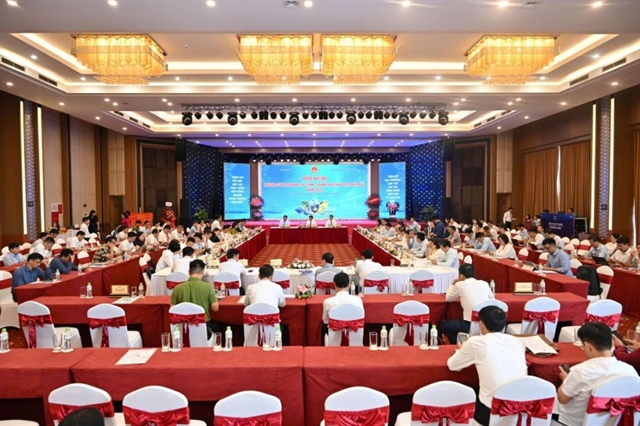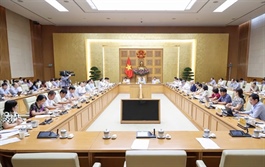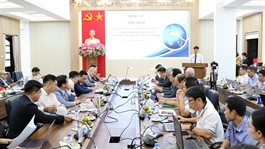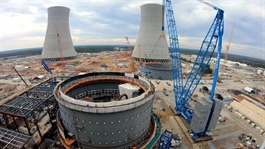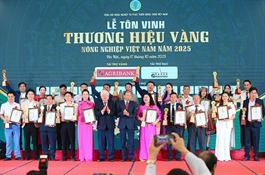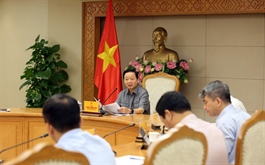Northern provinces seek energy boost to power growth
Northern provinces seek energy boost to power growth
As Northern Vietnam’s industrial expansion accelerates, energy security has become a central concern shaping provincial development plans and investment priorities.
|
At the Northern Industry and Trade Conference 2025 on October 17, provincial leaders and business representatives discussed the growing strain on power infrastructure amid surging demand. Energy supply was among the most debated issues, with delegates calling for clearer regulations, faster project approvals, and stronger coordination between central and local authorities to ensure stable electricity for production and growth.
Lai Chau Department of Industry and Trade director Vuong The Manh noted underlined inconsistencies in project tendering processes involving land use. “In some cases, the Department of Finance is in charge, in others the Department of Industry and Trade, and even sometimes local communes. This lack of uniformity causes confusion in determining the lead agency and delays implementation,” he said.
Difficulties also arise in surveying, planning, and supervision. Previously, companies were allowed to conduct their own surveys and develop datasets, while the state lacked resources to manage this task. As a result, most critical data remains in the hands of enterprises, creating complications in integrating provincial and corporate-level plans into national energy planning. The province recommended that the government add pricing mechanisms for new energy types such as solar, pumped storage, and hydro-based storage, while also considering the removal of mandatory tendering for small- and medium-scale projects to accelerate investment timelines.
Dien Bien Department of Industry and Trade director Le Thi Luong stressed that major infrastructure gaps are deterring energy investors. To date, the province lacks a 220kV transmission line and a 220kV transformer station, both crucial for integrating new power projects. The province urged Vietnam Electricity (EVN) to fast-track these essential facilities.
Dien Bien also called for revisions to the Law on Electricity and the Law on Investment, proposing exemptions from tendering requirements in special cases to allow priority for enterprises that have already conducted surveys and compiled data. “Current regulations do not provide preferential mechanisms for pioneering investors, leaving them at a disadvantage,” she remarked. In addition, Dien Bien requested early guidance from the Ministry of Industry and Trade on Decree 62/2025, which details enforcement of the Electricity Law on safety and supervision, a critical aspect for managing hydropower projects.
Son La province, meanwhile, showcased both achievements and difficulties. According to deputy director of the provincial Department of Industry and Trade, Quang Anh Tuan, renewable energy has been designated one of seven development pillars for 2020–2025. The province has a total potential capacity of 10,200MW, with nearly 4,000MW already operational, generating 12–15 billion kWh annually, equivalent to 4–5 per cent of national output. In 2024 alone, energy projects contributed VND2.9–3.4 trillion to local revenue, accounting for half of the province’s total budget.
However, despite the approval of Power Development Plan VIII over two years ago, no new projects in Son La have received permits. The province is now reviewing land use planning to synchronise with other sectors, while outlining five priority solutions including refining planning, enhancing inter-sectoral coordination, and attracting further investment into wind, solar, and pumped storage projects.
|
Responding to these concerns, Tran Hoai Trang, deputy director of the Electricity and Renewable Energy Authority under the Ministry of Industry and Trade, acknowledged the issues raised and confirmed that the ministry has been actively working on solutions. For example, current regulations classify hydropower projects with tunnels over 1.5km as 'special projects', triggering stricter requirements in supervision and tendering. Trang revealed that the ministry has petitioned the Ministry of Construction twice, and adjustments to ease these requirements are expected soon.
On the issue of 250 households in Son La still without access to electricity, the Ministry of Industry and Trade said it is working with the Ministry of Finance to address funding constraints related to Official Development Assistance sources.
Implementation is expected to begin shortly, ensuring electricity access for remote communities. Regarding proposals to waive tendering rules, Trang reiterated that under the Electricity Law, when two or more investors register, tendering remains mandatory. However, he admitted that delays stem not solely from regulations but from fragmented processes in evaluation and selection at the local level.
He also highlighted the government’s newly issued Decree 225, which relaxes requirements on 1:2000 scale planning maps, offering more flexibility for large-scale energy projects. This change is expected to unlock many legal bottlenecks and create more space for clean, sustainable energy development.
Complementing the ministry’s stance, Dinh The Phuc, member of the board at EVN, emphasised that the electricity industry and related services serve both economic growth and citizens’ daily lives. With demand continuously rising in both volume and quality, EVN is striving to meet expectations. He stressed the importance of closer collaboration between provincial power companies and local departments of industry and trade, which oversee planning and investment. “There are still gaps in coordination, but we are committed to addressing feedback from local departments and improving efficiency in the coming period,” Phuc said.
EVN also outlined three key proposals to support stable supply. First, provinces facing delays in updated energy planning should temporarily rely on existing frameworks to proceed with investor selection, preventing unnecessary stagnation. Second, local departments were urged to assist in land clearance to meet project deadlines. Third, EVN called on local governments to actively promote public awareness on energy conservation, which remains a critical tool for ensuring long-term stability of the grid.
- 09:33 20/10/2025


